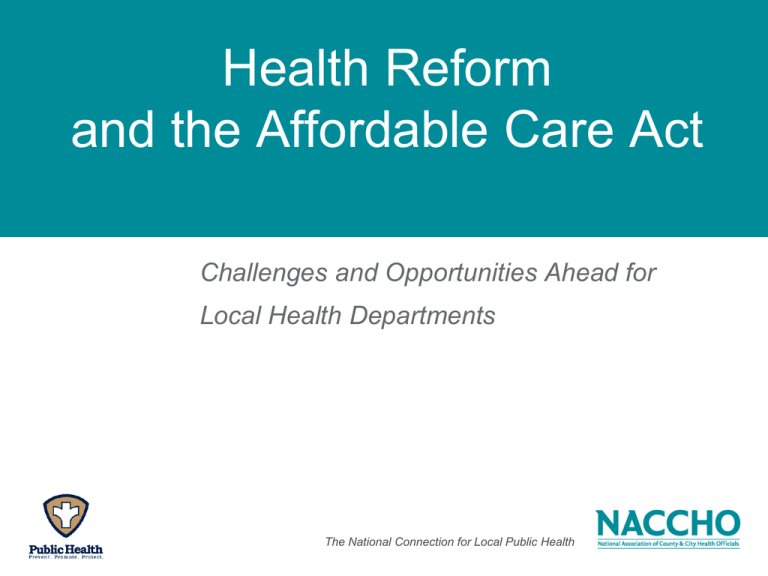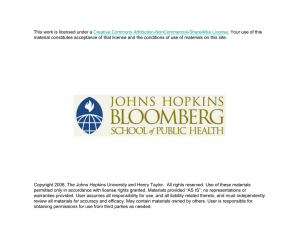Health Reform and the Affordable Care Act Challenges and Opportunities Ahead for
advertisement

Health Reform and the Affordable Care Act Challenges and Opportunities Ahead for Local Health Departments The National Connection for Local Public Health THE BIG PICTURE The Patient Protection and Affordable Care Act (ACA) sets the stage for a comprehensive national approach to population-based prevention. • Health in all policies through a National Prevention Strategy • Recognition of policy and environmental change approaches to public health • Mandatory appropriation (new money) THE BIG PICTURE The ACA includes provisions for: • Public health workforce development • Enhancement of the evidence base for prevention and public health • First dollar coverage of clinical preventive services by all public and private insurers (for new plans) ACA Public Health Benefits Prevention and Public Health Fund $15 Billion/10 years $500 million/FY2010, ramping up to $2 billion in FY2015 and each year thereafter •Provides for expanded and sustained national investment in prevention and public health programs authorized by the Public Health Service Act for prevention, wellness, and public health activities, including prevention research and health screenings The Prevention and Public Health Fund – A Groundbreaking Approach • A “mandatory appropriation” (does not require Congressional action for funds to be available each year). This was a huge victory for public health. • Congress and the Administration have concurrent authority to allocate the Fund. If Congress does not do so, the Administration will. The “Reality Check” Has Already Begun • FY10 - $500 million, of which half went to primary care workforce development by decision of Administration. • FY11 - $750 million – to public health and prevention • FY12 - $1 billion – at the mercy of a new Congress. • The first Congressional attempt to defund the Fund failed last year and more attacks are a certainty. • Few local health departments have received any dollars from the Fund so far. Prevention and Public Health Fund – Current Status FY11 - $750 million $145 million – Community Transformation Grants $40 million – Natl Public Health Improvement Initiative $40 million – Epi/Lab Capacity Grants $52.2 million – Comprehensive Chronic Disease $20 million – Public Health Workforce Development The “Reality Check” If the Prevention and Public Health Fund survives: • Annual advocacy for allocations that benefit local health departments will still be needed. • The competition for new funds is intense. • There is insufficient funding for all the new programs authorized by the ACA. Some promises will be empty. The Work of Implementation Has Barely Begun The new law provides a host of essential building blocks for improving health status through evidence-based prevention and public health. Sustained advocacy for funding and for sound federal and state policies that guide implementation will be critical. It will take many years and a healthier economy before that potential can be realized. The Big Question Question: Answer: Is Health Reform a Threat or an Opportunity for Local Yes. Health Departments? The Rules of the Game Are Changing But the New Rules are Unknown Local Health Departments Across the Country Are In the Same Boat: Threat or Opportunity? A Conundrum for Health Departments and their Partners On the one hand, the Administration is moving full speed ahead on implementation. On the other hand, the GOP, with a new majority in the House (but not the Senate) is determined to gut the law. So What Do We Do? Two Things At Once. 1. Play offense. Assume the key aspects of the law will remain in force and work to address the opportunities and challenges locally. AND 2. Play defense. Explain the law to your communities and join NACCHO in advocating vigorously for maintenance of the Prevention and Public Health Fund and other aspects essential to improving the nation’s health. Local Opportunities: New Roles and Functions to Consider • Expanded role in Medicaid enrollment and in outreach and enrollment for state health insurance exchanges • Expanded role in case management. • Maintain and enhance role as health data and information experts for the community. New Roles and Functions to Consider • Collaborate with non-profit hospitals to conduct community health needs assessments required by IRS. • Develop new business models to bill or contract for services. • Leverage the dollars flowing to FQHC’s by developing a public entity FQHC. New Partnerships to Consider • Convene partnerships for population-based prevention, including the engagement of new partners in policy development. • Pursue relationships with groups forming Accountable Care Organizations. • Establish new arrangements with FQHC’s for co-location of services, referrals, and/or purchase of services. Some Questions to Ask When more health department clients have insurance cards in hand, what will be the impact on financing and mix of clinical and populationbased services in my community? Should I plan to transition clinical services to other providers and focus more resources on population-based prevention? Systemic Challenges That Affect LHDs’ Approaches • Lack of community support for health system reform. • Lack of State willingness or capacity to implement Affordable Care Act. • Possible influx of new patients to health care systems with inadequate reimbursement or resources (particularly PCPs) to care for them. Local Health Department Challenges • Viability as a safety net provider. • Inability to compete as other entities assume greater roles in prevention and primary care. • Future funding reductions for public health services erroneously deemed unnecessary by policy makers when expanded health insurance coverage is in place. Local Challenges • Realigning resources for altered roles. • Training the current public health workforce for altered roles. • Pursuing new opportunities after years of cuts have weakened the public health system. Some Views from Other Local Health Departments (from open discussion at NACCHO Annual meeting) • “This is all very scary but also very exciting.” • Our fear is that we will have to redefine ourselves. We may have to give up what we are more comfortable with.” Some Views from Other Local Health Departments (from open discussion at NACCHO Annual meeting) • “We need to be the data and information gurus in the community….we look at indicators and outcomes.” • “We can make real health reform work in the community. I know that we all can’t just do that tomorrow, but if we nurture new partnerships and collaborations, those are the keys to making this work.” Some Views from Other Local Health Departments (from open discussion at NACCHO Annual meeting) • “You have to get yourself to the table to be part of the conversation….Pay attention! Make sure you are there!) (reference to regional discussions among hospitals, health insurers, community health centers) • “We’ve got to stop saying health care reform won’t work and rather bond together and figure out how to make it work for our communities.” • “ NACCHO Resources A webpage with resources that we are populating as fast as we can: http://www.naccho.org/advocacy/healthreform.cfm Tell us what you think and what you need! Email: healthreform@naccho.org Other Resources White House: http://www.whitehouse.gov/HealthReform Department of Health and Human Services: http://www.healthcare.gov/ Kaiser Family Foundation: http://healthreform.kff.org/ Families USA: http://www.familiesusa.org


